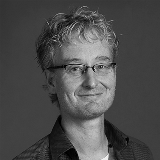About
Max Welling is a computer scientist who works in artificial intelligence (expert systems, machine learning, robotics).
He holds a research chair in machine learning at the University of Amsterdam; is co-founder of Scyfer BV, a university spin-off in deep learning; and has held postdoc positions at the California Institute of Technology, University College London and the University of Toronto. Welling received his PhD in 1998 under supervision of Nobel laureate Gerard ‘t Hooft. He has served on the editorial boards of JMLR and JML; was an associate editor for Neurocomputing and JCGS; and has received grants from Google, Facebook, Yahoo, NSF, NIH, NWO and ONR-MUR. Currently, Welling serves on the board of the NIPS foundation and of the Data Science Research Center in Amsterdam; directs the Amsterdam Machine Learning Lab (AMLAB); and co-directs the Qualcomm-UvA deep learning lab (QUVA), the Bosch-UvA Deep Learning lab (DELTA) and the AML4Health Lab.
Awards
- Program Chair, ECCV, 2016
- Associate Editor in Chief, IEEE TPAMI, 2011–15
- General Chair, NIPS, 2014, Program Chair 2013
- Best Paper Award, ICML, 2012
- ECCV Koenderink Prize, 2010
- Program Chair, AISTATS, 2009
- National Science Foundation Career Grant, 2005
Relevant Publications
Kingma, D. et al. “Variational Dropout and the Local Reparameterization Trick.” Paper presented at NIPS, 2015.
Korattikara, A. et al. “Bayesian Dark Knowledge.” Paper presented at NIPS, 2015.
Kingma, D. et al. “Semi-supervised Learning with Deep Generative Models.” In Proceedings of NIPS 2014, 3581–3589.
Cohen, T., and M. Welling. “Harmonic Exponential Families on Manifolds.” Paper presented at ICML, 2015.
Kingma, D., and M. Welling. “Auto-Encoding Variational Bayes.” Paper presented at ICLR, 2014.
